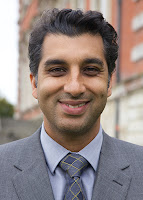As I write the Black Friday sales have been and gone, and the Christmas countdown is well underway. The frenzied activity leading up to 25 December is wonderfully exciting. Here at Bryanston, a huge Christmas tree is already dominating the main hall and in millions of homes, schools and businesses across the world people are starting their preparations. Christmas is rightly a great opportunity to decorate, get in touch and to celebrate with family and friends.
However, for many the preparations can be tough. There are people who are struggling to get everything done, there are those who are finding it hard to make ends meet and there are those who are anxious about being alone when so many others seem to be enjoying themselves. We need to do what we can for all those who will find it difficult and challenging. As a school we know that we can make such a difference when we put our minds to it. This term as a community we have raised a huge amount of money during the Charities Fair, given boxes of food to the Blandford Foodbank at our Harvest Festival, reached out to those who might be on their own through our Tuesday Club, remembered the sacrifice of those who enable us to live in a free country at Remembrance Day and much more.
There is a small book that I discovered a few years ago (and have mentioned before) entitled Do Nothing, Christmas is Coming. How can anyone suggest such a thing – there is so much to do!
What this book dares to suggest is that during this season we should try and slow down. We try so hard to get everything just right for Christmas, but at times we can lose our sense of perspective. Let’s think of Mary and Joseph. Were they ready? Not really. She was engaged but also a pregnant teenager trying to get to Bethlehem. The place where Jesus was born was far from ideal, an unhygienic stable was not the best place to give birth. The shepherds who came to visit the new born baby came straight from the fields with no time to change into their Sunday best. After a few days Joseph and Mary had to flee Bethlehem under threat of death from Herod and became refugees in Egypt for a time. All this was hardly well prepared.
Perhaps what this book is suggesting is that we do the things that really matter and not try too hard to make everything perfect. The world was certainly not ready for Jesus’ arrival, but he came anyway.
My hope and prayer for this Advent, as we lead ever quickly to Christmas Day, is that we can all slow down just a little, take our time to focus on things that really matter and those we love, and to help those who have so very little. If we can do that then maybe, just maybe, the true Christmas gift, the message of love of God through Jesus, can sustain the world even more effectively in 2017.
What this book dares to suggest is that during this season we should try and slow down. We try so hard to get everything just right for Christmas, but at times we can lose our sense of perspective. Let’s think of Mary and Joseph. Were they ready? Not really. She was engaged but also a pregnant teenager trying to get to Bethlehem. The place where Jesus was born was far from ideal, an unhygienic stable was not the best place to give birth. The shepherds who came to visit the new born baby came straight from the fields with no time to change into their Sunday best. After a few days Joseph and Mary had to flee Bethlehem under threat of death from Herod and became refugees in Egypt for a time. All this was hardly well prepared.
Perhaps what this book is suggesting is that we do the things that really matter and not try too hard to make everything perfect. The world was certainly not ready for Jesus’ arrival, but he came anyway.
My hope and prayer for this Advent, as we lead ever quickly to Christmas Day, is that we can all slow down just a little, take our time to focus on things that really matter and those we love, and to help those who have so very little. If we can do that then maybe, just maybe, the true Christmas gift, the message of love of God through Jesus, can sustain the world even more effectively in 2017.























